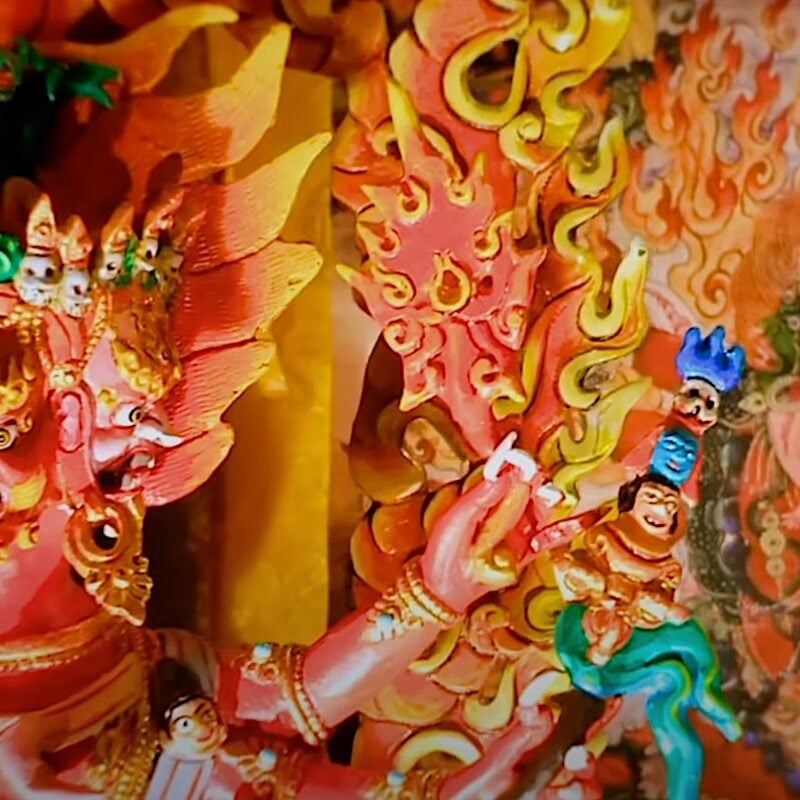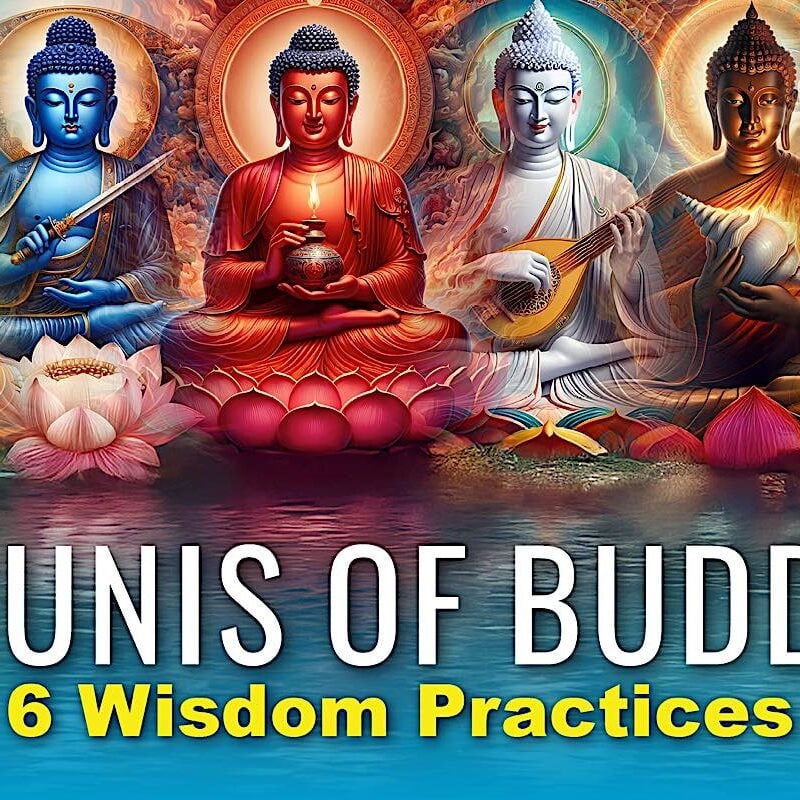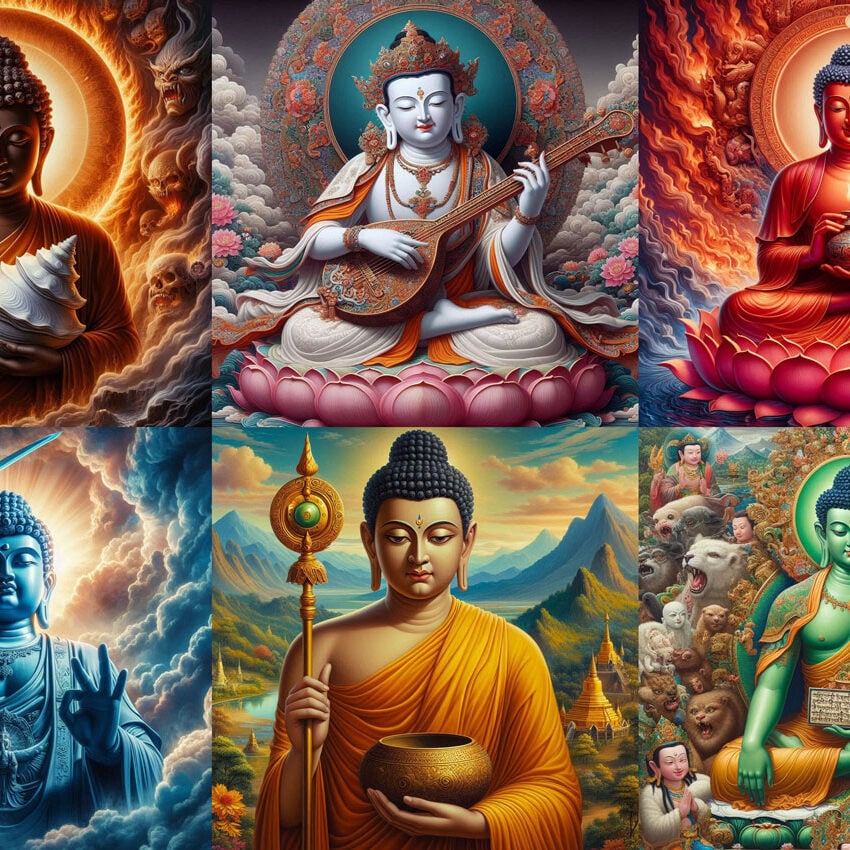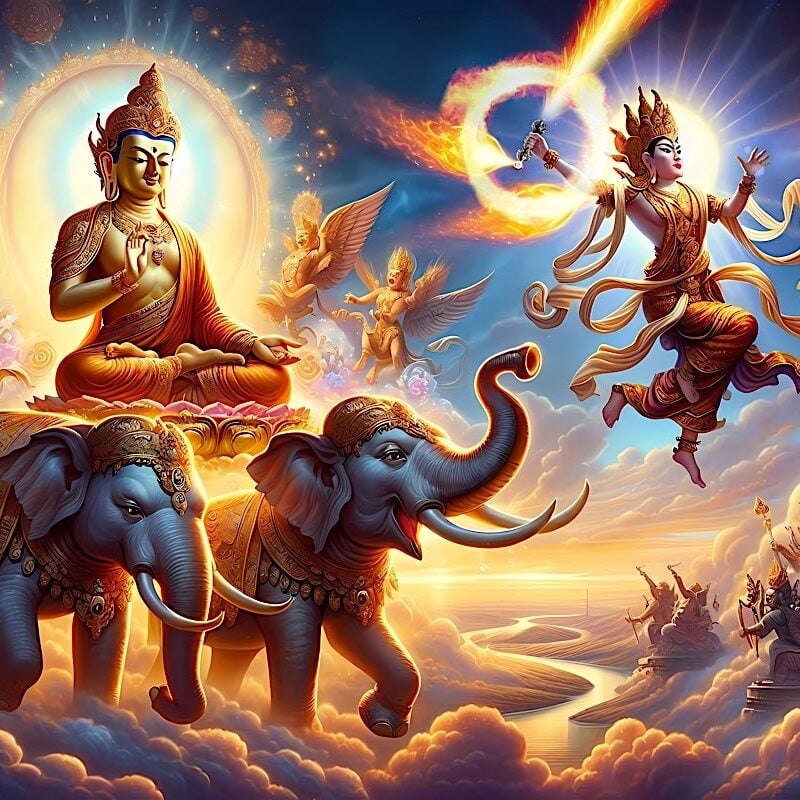Jataka Tales 1: First of the Tales of Buddha’s Previous Lives — APAṆṆAKA-JĀTAKA, the Wise Merchant and the Foolish Merchant
Who’s Who in this Story
In Buddhist Canon, Buddha told the tales of his previous 500 plus incarnations, when he was a “Bodhisattva” — not yet the Conqueror, the Buddha. (For an introduction to the fabulous Jataka Tales, see>>)
In these stories of incarnation, he and his disciples are often identified. In this amazing story:
- The Wise Merchant — was the Bodhisattva, prior to becoming the Buddha.
- The Foolish Merchant — was Devadatta, the troubled cousin and brother-in-law of the Buddha.
- The Goblin (Demon) — can be viewed as a metaphor for our own doubts/temptations/ thoughts that lead us to abandon our refuge in the Three Jewels: Buddha Dharma and Sangha.
Buddha told this story to a wealthy banker and others who took refuge in the Three Jewels _ Buddha, Dharma, and Sangha — only to regularly forsake that refuge, an issue not unfamiliar to many modern practitioners. To explain the dangers of this fickle type of practice, he told the story of the Wise and the Foolish Merchant:
“Then, rising up from his seat and saluting the Blessed One, the layman Anātha-piṇḍika burst into praises, and with clasped hands raised in reverence to his forehead, spoke thus:–“It is clear to us, Sir, that in these present days these disciples were led by error into forsaking the supreme refuge. But the bygone destruction of those opinionated ones in the demon-haunted wilderness, and the prospering of the men who clave to the truth, are hidden from us and known only to you. May it please the Blessed One, as though causing the full moon to rise in the sky, to make this thing clear to us.”
Then said the Blessed One:–“It was solely to brush away the world’s difficulties that by the display of the Ten Perfections 1 through myriad æons I won omniscience. Give ear and hearken, as closely as if you were filling a tube of gold with lion’s marrow.”
Having thus excited the Treasurer’s attention, he made clear the thing that re-birth had concealed from them, as though he were releasing the full moon from the upper air, the birthplace of the snows.”
NOTE: The subheads are not part of the original text, and are strictly for navigation on this site.

Jataka 1
APAṆṆAKA-JĀTAKA
Once on a time in the city of Benares in the Kāsi country there was a king named Brahmadatta. In those days the Bodhisatta was born into a merchant’s family, and growing up in due course, used to journey about trading with, five hundred carts, travelling now from east to west and now from west to east. There was also at Benares another young merchant, a stupid blockhead, lacking resource.
Now at the time of our story the Bodhisatta had loaded five hundred carts with costly wares of Benares and had got them all ready to start. And so had the foolish young merchant too. Thought the Bodhisatta, “If this foolish young merchant keeps me company all along, and a thousand carts travel along together, it will be too much for the road; it will be a hard matter to get wood, water, and so forth for the men, or grass for the oxen. Either he or I must go on first.”
So he sent for the other and laid his view before him, saying, “The two of us can’t travel together; would you rather go first or last?”
Thought the other, “There will be many advantages if I go on first. I shall have a road which is not yet cut up; my oxen will have the pick of the grass; my men will have the pick of the herbs for curry; the water will be undisturbed; and, lastly, I shall fix my own price for the barter of my goods.” Accordingly he replied, “I will go first, my dear sir.”
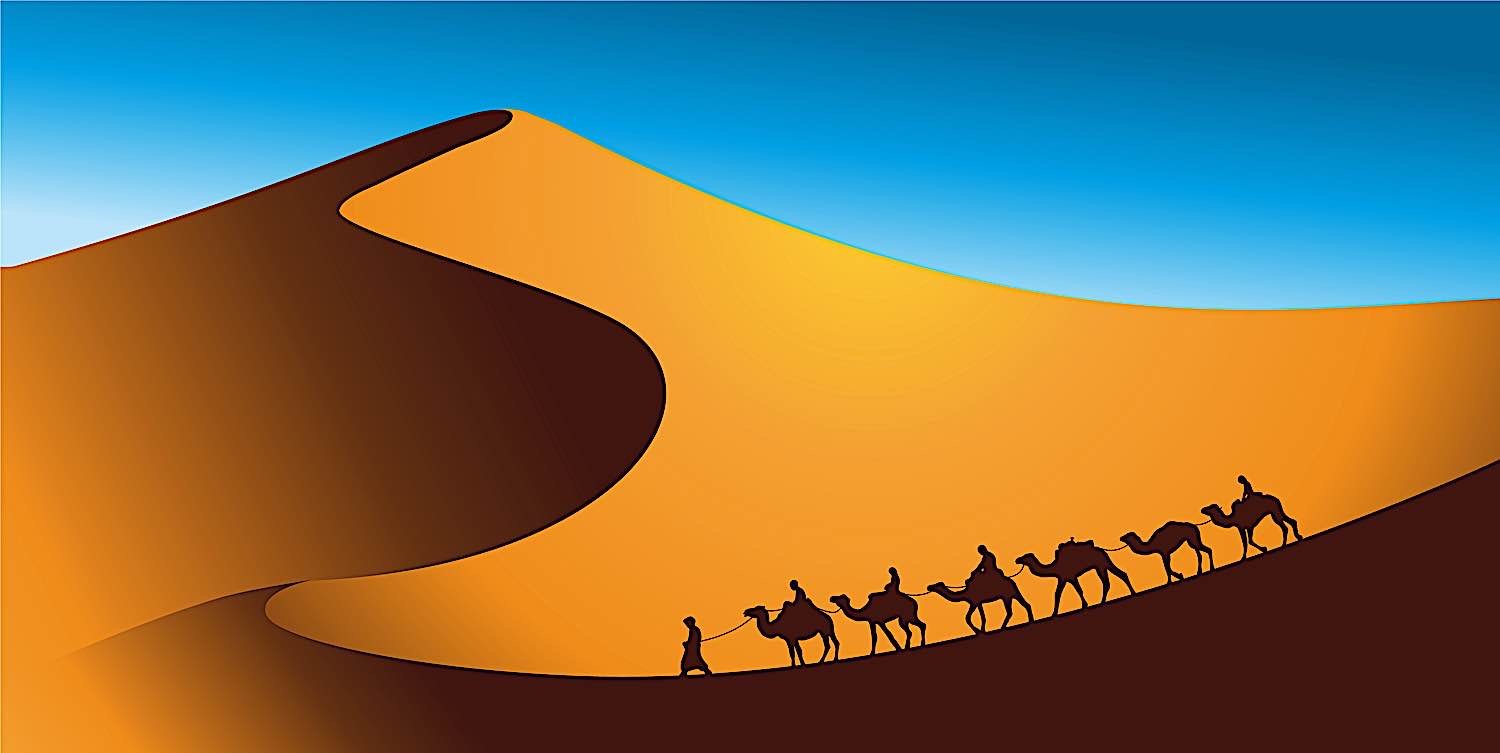
The Bodhisatta, on the other hand, saw many advantages in going last, for he argued thus to himself:–“Those who go first will level the road where it is rough, whilst I shall travel along the road they have already travelled; their oxen will have grazed off the coarse old grass, whilst mine will pasture on the sweet young growth which will spring up in its place; my men will find a fresh growth of sweet herbs for curry where the old ones have been picked; where there is no water, the first caravan will have to dig to supply themselves, and we shall drink at the wells they dug. Haggling over prices is killing work; whereas I, following later, shall barter my wares at the prices they have already fixed.” Accordingly, seeing all these advantages, he said to the other, “Then go you first, my dear sir.”
The Foolish Merchant Sets Out
“Very well, I will,” said the foolish merchant. And he yoked his carts and set out. Journeying along, he left human habitations behind him and came to the outskirts of the wilderness.
(Now wildernesses are of the five following kinds:–robber wildernesses, wild-beast wildernesses, drought wildernesses, demon wildernesses, and famine wildernesses. The first is when the way is beset by robbers; the second is when the way is beset by lions and other wild beasts; the third is when there is no bathing or water to be got; the fourth is when the road is beset by demons; and the fifth is when no roots or other food are to be found. And in this fivefold category the wilderness in question was both a drought, and a demon, wilderness.)
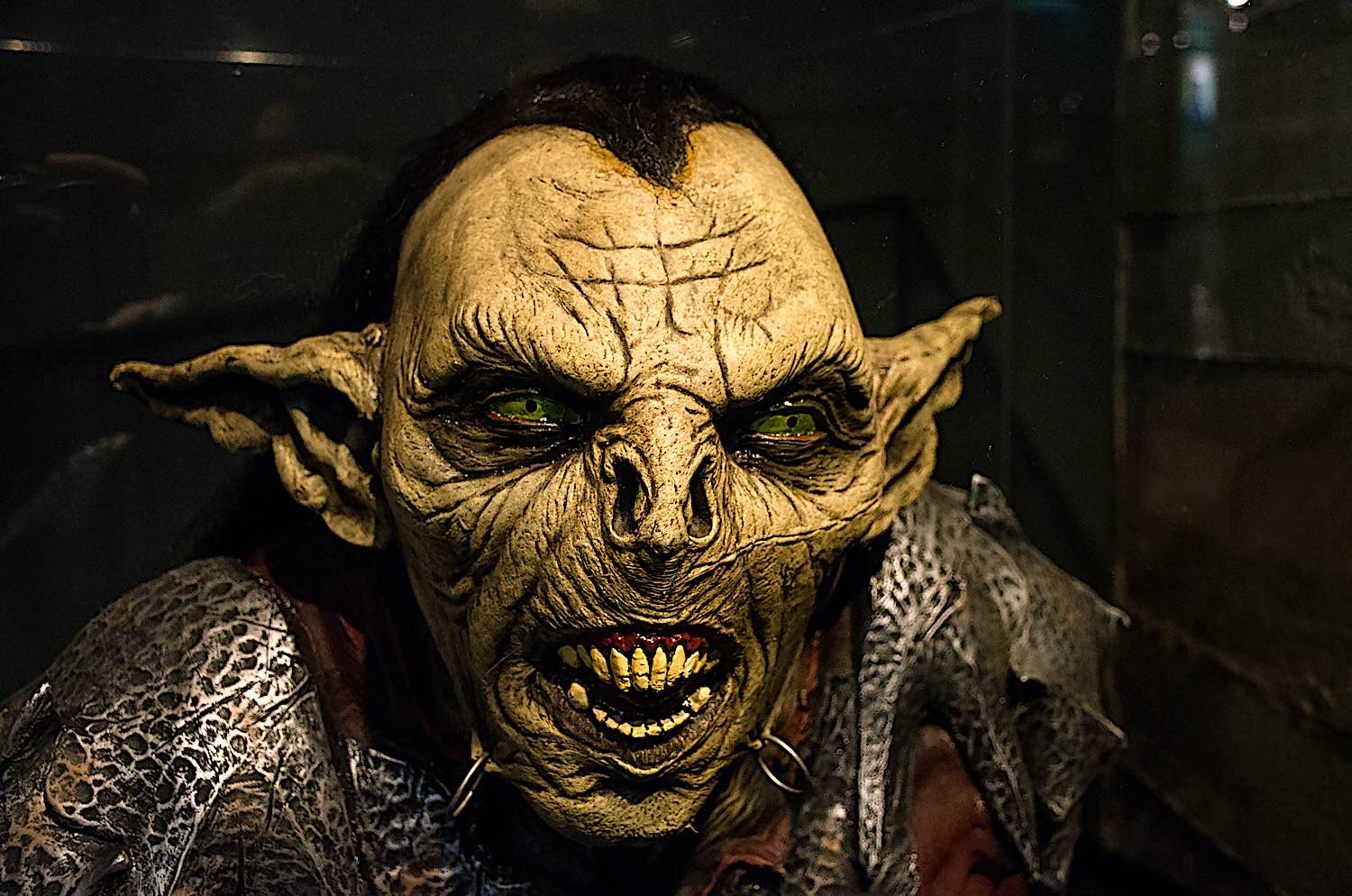
The Goblin
Accordingly this young merchant took great big water-jars on his carts, and filling them with water, set out to cross the sixty leagues of desert which lay before him. Now when he had reached the middle of the wilderness, the goblin who haunted it said to himself, “I will make these men throw away their stock of water, and devour them all when they are faint.”
So he framed by his magic power a delightful carriage drawn by pure white young bulls. With a retinue of some ten or twelve goblins bearing bows and quivers, swords and shields, he rode along to meet them like a mighty lord in this carriage, with blue lotuses and white water-lilies wreathed round his head, with wet hair and wet clothes, and with muddy carriage-wheels. His attendants, too, in front and rear of him went along with their hair and clothes wet, with garlands of blue lotuses and white water-lilies on their beads, and with bunches of white lotuses in their hands, chewing the esculent stalks, and dripping with water and mire.
Now the leaders of caravans have the following custom: whenever the wind blows in their teeth, they ride on in front in their carriage with their attendants round them, in order to escape the dust; but when the wind blows from behind them, then they ride in like fashion in the rear of the column. And, as on this occasion the wind was blowing against them, the young merchant was riding in front. When the goblin became aware of the merchant’s approach, he drew his carriage aside from the track and greeted him kindly, asking him whither he was going.
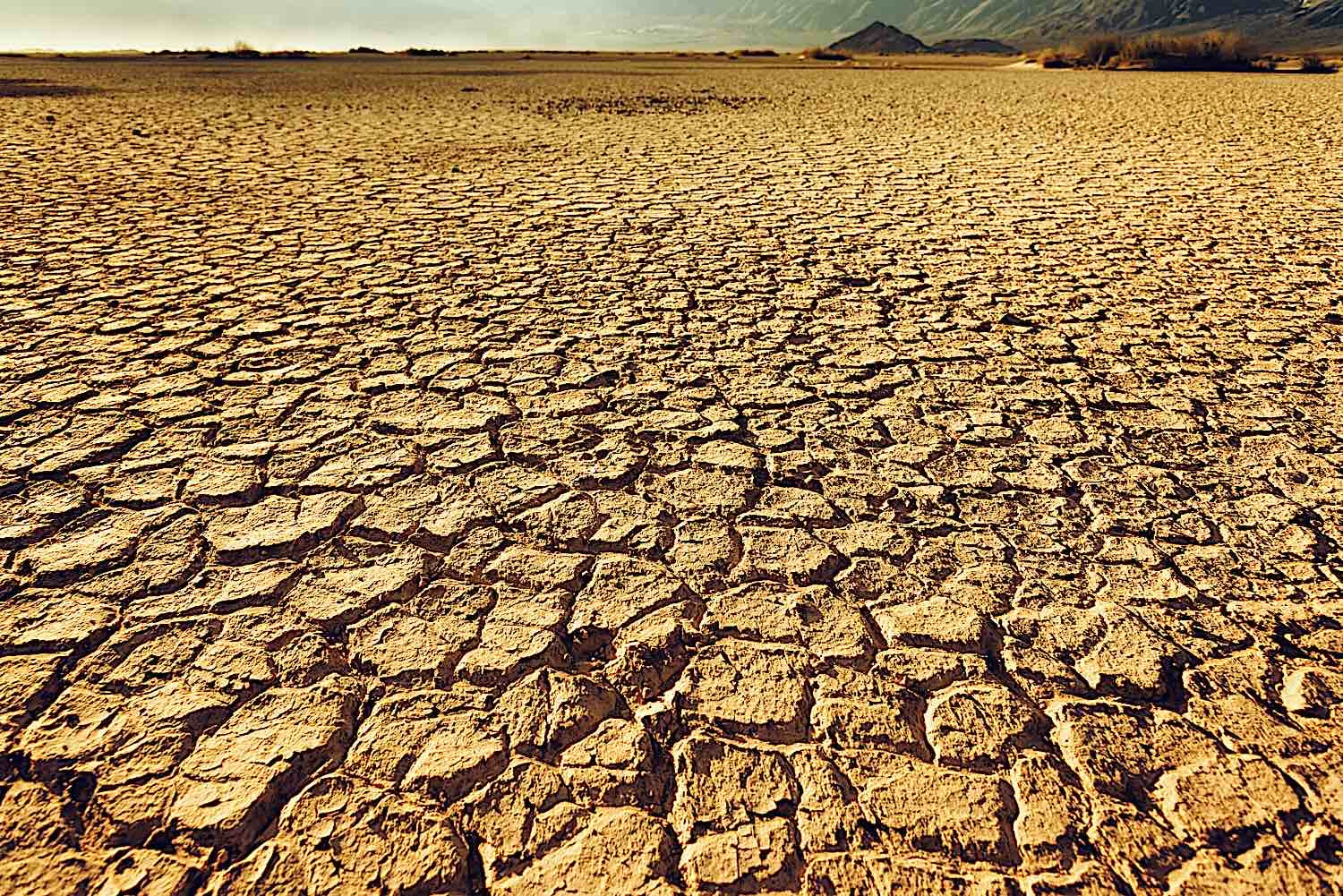
The leader of the caravan too caused his carriage to be drawn aside from the track so as to let the carts pass by, whilst he stayed by the way and thus addressed the goblin: “We are just on our way from Benares, sir. But I observe that you have lotuses and water-lilies on your heads and in your hands, and that your people are chewing the esculent stalks, and that you are all muddy and dripping with wet. Pray did it rain while you were on the road, and did you come on pools covered with lotuses and water-lilies?”
Hereon the goblin exclaimed, “What did you say? Why, yonder appears the dark-green streak of the forest, and thence onward there is nothing but water all through the forest. It is always raining there; the pools are full; and on every side are lakes covered with lotuses and water-lilies.”
Then as the line of carts passed by, he asked where they were bound for. “To such and such a place,” was the reply.
“And what wares have you got in this cart and in this?”
“So and so.”
“And what might you have in this last cart which seems to move as if it were heavily laden?”
“Oh, there’s water in that.”
“You did well to carry water with you from the other side. But there is no need for it now, as water is abundant on ahead. So break the jars and throw the water away, that you may travel easier.” And he added, “Now continue on your way, as we have stopped too long already.”
Then he went a little way further on, till he was out of sight, when he made his way back to the goblin-city where he dwelt.
Such was the folly of that foolish merchant that he did the goblin’s bidding, and had his jars broken and the water all thrown away,–without saving so much even as would go in the palm of a man’s hand. Then he ordered the carts to drive on. Not a drop of water did they find on. ahead, and thirst exhausted the men. All day long till the sun went down they kept on the march; but at sunset they unyoked their carts and made a laager, tethering the oxen to the wheels.
The oxen had no water to drink, and the men none to cook their rice with; and the tired-out band sank to the ground to slumber. But as soon as night fell, the goblins came out from their city, and slew every single one of those men and oxen; and when they had devoured their flesh, leaving only the bare bones, the goblins departed. Thus was the foolish young merchant the sole cause of the destruction of that whole band, whose skeletons were strewn in every conceivable direction, whilst the five hundred carts stood there with their loads untouched.
The Wise Merchant — the Bodhisattva
Now the Bodhisattva allowed some six weeks to pass by after the starting of the foolish young merchant, before he set out. Then he proceeded from the city with his five hundred carts, and in due course came to the outskirts of the. wilderness.
Here he had his water-jars filled and laid in an ample stock of water; and by beat of drum he had his men assembled in camp, and thus addressed them:–“Let not so much as a palmful of water be used without my sanction. There are poison trees in this wilderness; so let no man among you eat any leaf, flower, or fruit which he has not eaten before, without first asking me.”
With this exhortation to his men, he pushed on into the wilderness with his 500 carts. When he had reached the middle of the wilderness, the goblin made his appearance on the Bodhisatta’s path as in the former case. But, as soon as he became aware of the goblin, the Bodhisatta saw through him; for he thought to himself, “There’s no water here, in this ‘Waterless Desert.’
This person with his red eyes and aggressive bearing, casts no shadow. Very likely he has induced the foolish young merchant who preceded me, to throw away all his water, and then, waiting till they were worn out, has eaten up the merchant with all his men. But he doesn’t know my cleverness and ready wit.”
Then he shouted to the goblin, “Begone! We’re men of business, and do not throw away what water we have got, before we see where more is to come from. But, when we do see more, we may be trusted to throw this water away and lighten our carts.”
The goblin rode on a bit further till he was out of sight, and then betook himself back to his home in the demon city. But when the goblin had gone, the Bodhisatta’s men said to him, “Sir, we heard from those men that yonder is the dark-green streak of the forest appearing, where they said it was always raining. They had got lotuses on their heads and water-lilies in their hands and were eating the stalks, whilst their clothes and hair were wringing wet, with water streaming off them. Let us throw away our water and get on a bit quicker with lightened carts.”
On hearing these words, the Bodhisatta ordered a halt and had the men all mustered. “Tell me,” said he; “Did any-man among you ever hear before today that there was a lake or a pool in this wilderness?”
“No, sir,” was the answer.
“Why it’s known as ‘the Waterless Desert’.”
“We have just been told by some people that it is raining just on ahead, in the belt of forest; now how far does a rain-wind carry?”
“A league, sir.”
“And has this rain-wind reached any one man here?”
“No, sir.”
“How far off can you see the crest of a storm-cloud?”
“A league, sir.”
“And has any one man here seen the top of even a single storm-cloud?”
“No, sir.”
“How far off can you see a flash of lightning?”
“Four or five leagues, sir.”
“And has any one man here seen a flash of lightning?”
“No, sir.”
“How far off can a man hear a peal of thunder?”
“Two or three leagues, sir.”
“And has any man here heard a peal of thunder?”
“No, sir.”
“These are not men but goblins. They will return in the hope of devouring us when we are weak and faint after throwing away our water at their bidding. As the young merchant who went on before us was not a man of resource, most likely he has been fooled into throwing his water away and has been devoured when exhaustion ensued. We may expect to find his five hundred carts standing just as they were loaded for the start; we shall come on them today. Press on with all possible speed, without throwing away a drop of water.”
Urging his men forward with these words, he proceeded on his way till he came upon the 500 carts standing just as they had been loaded and the skeletons of the men and oxen lying strewn in every direction. He had his carts unyoked and ranged in a circle so as to form a strong laager; he saw that his men and oxen had their supper early, and that the oxen were made to lie down in the middle with the men round them; and he himself with the leading men of his band stood on guard, sword in hand, through the three watches of the night, waiting for the day to dawn.
On the morrow at daybreak when he had had his oxen fed and everything needful done, he discarded his own weak carts for stronger ones, and his own common goods for the most costly of the derelict goods. Then he went on to his destination, where he bartered his stock for wares of twice or three times their value, and came back to his own city without losing a single man out of all his company.
_____________________________
This story ended, the Master said, “Thus it was, layman, that in times past the fatuous came to utter destruction, whilst those who clave to the truth, escaping from the demons’ hands, reached their goal in safety and came back to their homes again.”
And when he had thus linked the two stories together, he, as the Buddha, spoke the following stanza for the purposes of this lesson on the Truth:
Then some declared the sole, the peerless truth;
But otherwise the false logicians spake.
Let him that ‘s wise from this a lesson take,
And firmly grasp the sole, the peerless truth.
Thus did the Blessed One teach this lesson respecting Truth. And he went on to say:
“What is called walking by truth, not only bestows the three happy endowments, the six heavens of the realms of sense, and the endowments of the higher Realm of Brahma, but finally is the giver of Arahatship; whilst what is called walking by untruth entails re-birth in the four states of punishment or in the lowest castes of mankind.”
Further, the Master went on to expound in sixteen ways the Four Truths at the close of which all those five hundred disciples were established in the Fruit of the First Path.
Having delivered his lesson and his teaching, and having told the two stories and established the connexion linking them together, the Master concluded by identifying the Birth as follows:–“Devadatta was the foolish young merchant. of those days; his followers were the followers of that merchant; the followers o the Buddha were the followers of the wise merchant, who was myself.”
More articles by this author
Search
Latest Features
Please support the "Spread the Dharma" mission as one of our heroic Dharma Supporting Members, or with a one-time donation.
Please Help Support the “Spread the Dharma” Mission!

Be a part of the noble mission as a supporting member or a patron, or a volunteer contributor of content.
The power of Dharma to help sentient beings, in part, lies in ensuring access to Buddha’s precious Dharma — the mission of Buddha Weekly. We can’t do it without you!
A non-profit association since 2007, Buddha Weekly published many feature articles, videos, and, podcasts. Please consider supporting the mission to preserve and “Spread the Dharma." Your support as either a patron or a supporting member helps defray the high costs of producing quality Dharma content. Thank you! Learn more here, or become one of our super karma heroes on Patreon.
Lee Kane
Author | Buddha Weekly
Lee Kane is the editor of Buddha Weekly, since 2007. His main focuses as a writer are mindfulness techniques, meditation, Dharma and Sutra commentaries, Buddhist practices, international perspectives and traditions, Vajrayana, Mahayana, Zen. He also covers various events.
Lee also contributes as a writer to various other online magazines and blogs.








